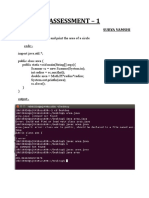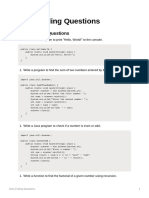0 ratings0% found this document useful (0 votes)
5 viewsjava programming
The document contains multiple Java programs that demonstrate various functionalities, including returning even numbers from an array, sorting an array with even numbers first, encrypting data, summing the largest elements, sorting strings, summing perfect squares, replacing digits in integers, generating Fibonacci series, and converting between binary and decimal. Each program includes user input handling and outputs the results accordingly. The examples illustrate fundamental programming concepts such as loops, conditionals, and array manipulations.
Uploaded by
Ananya SamantaCopyright
© © All Rights Reserved
We take content rights seriously. If you suspect this is your content, claim it here.
Available Formats
Download as DOCX, PDF, TXT or read online on Scribd
0 ratings0% found this document useful (0 votes)
5 viewsjava programming
The document contains multiple Java programs that demonstrate various functionalities, including returning even numbers from an array, sorting an array with even numbers first, encrypting data, summing the largest elements, sorting strings, summing perfect squares, replacing digits in integers, generating Fibonacci series, and converting between binary and decimal. Each program includes user input handling and outputs the results accordingly. The examples illustrate fundamental programming concepts such as loops, conditionals, and array manipulations.
Uploaded by
Ananya SamantaCopyright
© © All Rights Reserved
We take content rights seriously. If you suspect this is your content, claim it here.
Available Formats
Download as DOCX, PDF, TXT or read online on Scribd
You are on page 1/ 9
1.
Return even array from an array in java
import java.util.*;
public class Main
{
static int[] Main(int[] array,int n){
int count=0;
for(int a:array){
if(a%2==0){
count++;
}
}
int[] newarray=new int[count] ;
int i=0;
for(int a:array){
if(a%2==0){
newarray[i]=a;
i++;
}
}
return newarray;
}
public static void main(String[] args) {
Scanner sc=new Scanner(System.in);
System.out.println("Enter array elements");
int n=5;
int[] array= new int[n];
for(int i=0;i<n;i++){
array[i]=sc.nextInt();
}
int[] ans=Main(array,n);
for(int a:ans){
System.out.println(a);
}
}
}
2. You are given an array of size 'n'. Write a function that sorts the array
such that all even numbers appear before the odd numbers.
Example: Input: arr = [3, 8, 5, 12, 7, 10]
Output: [8, 12, 10, 3, 5, 7]
import java.util.*;
public class Main
{
static int[] sortarray(int[] arr,int n){
ArrayList<Integer> l1= new ArrayList<>();
for(int a:arr){
if(a%2==0){
l1.add(a);
}
}
for(int a:arr){
if(a%2!=0){
l1.add(a);
}
}
int[] array=new int[l1.size()];
for(int i=0;i<l1.size();i++){
array[i]=l1.get(i);
}
return array;
}
public static void main(String[] args) {
Scanner sc=new Scanner(System.in);
System.out.println("Enter the size of array");
int size= sc.nextInt();
System.out.println("Enter array elements");
int [] arr = new int[size];
for(int i=0;i<size;i++){
arr[i]=sc.nextInt();
}
int[] ans= sortarray(arr,size);
System.out.println(Arrays.toString(ans));
}
}
//or,
import java.util.Arrays;
public class Main {
public static void main(String[] args) {
int[] arr = {3, 8, 5, 12, 7, 10};
int[] sortedArr = sortEvenOdd(arr);
System.out.println(Arrays.toString(sortedArr));
}
public static int[] sortEvenOdd(int[] arr) {
int n = arr.length;
int[] result = new int[n];
int index = 0;
// First, add all even numbers
for (int num : arr) {
if (num % 2 == 0) {
result[index++] = num;
}
}
// Then, add all odd numbers
for (int num : arr) {
if (num % 2 != 0) {
result[index++] = num;
}
}
return result;
}
}
3. Encript the data adding character in index+3
Input: 25143 3
Output: 43251
import java.util.*;
class HelloWorld {
static String encription(String data,int key ){
StringBuilder sb = new StringBuilder();
for(int i=0;i<data.length();i++){
int index=(i+key)%data.length();
sb.append(data.charAt(index));
}
return sb.toString();
}
public static void main(String[] args) {
Scanner sc= new Scanner(System.in);
System.out.println("Enter a String");
String data=sc.nextLine(); //25143
System.out.println("Enter the key value");
int key=sc.nextInt(); //3
String ans=encription(data,key);
System.out.println(ans); //43251
}
}
4. sum of largest and second largest element in the array
import java.util.*;
public class Main
{
static int function(int[] arr,int n){
Arrays.sort(arr);
int size=arr.length;
return arr[size-1]+arr[size-2];
}
public static void main(String[] args) {
System.out.println("Enter the size of array");
Scanner sc=new Scanner(System.in);
int size=sc.nextInt();
System.out.println("Enter array elements");
int[] arr=new int[size];
for(int i=0;i<size;i++){
arr[i]=sc.nextInt();
}
int ans=function(arr,size);
System.out.println(ans);
}
}
5. WAP to sort a string in alphabetical order
import java.util.*;
public class Main {
public static void main(String[] args) {
String str = "hello";
// Convert the string to a char array
char[] ch = str.toCharArray();
// Sort the char array
Arrays.sort(ch);
// Convert the sorted char array back to a string
String sortedString = new String(ch);
// Print the result
System.out.println("Sorted string: " + sortedString);
}
}
6. Sum of positive perfect square elements in an array
public class PerfectSquareSum {
// Method to return the sum of positive perfect square elements
public static int sumOfPerfectSquares(int[] arr) {
int sum = 0;
for (int num : arr) {
if (num > 0 ){
int sqrt = (int) Math.sqrt(num);
if (sqrt * sqrt == num){
sum += num;
}
}
}
return sum;
}
public static void main(String[] args) {
int[] arr = {-3, 4, -2, 5, 0, 16, 25, 6};
int result = sumOfPerfectSquares(arr);
System.out.println("Sum of positive perfect square elements: " + result);
}
}
7. WAP to Replace all 0’s with 1 in a given integer in java
import java.util.Scanner;
public class ReplaceZerosWithOnes {
public static void main(String[] args) {
// Create a scanner object to read input
Scanner scanner = new Scanner(System.in);
// Prompt user to enter an integer
System.out.print("Enter an integer: ");
int number = scanner.nextInt();
// Convert the integer to a string
String numberStr = Integer.toString(number);
// Replace all occurrences of '0' with '1'
String replacedStr = numberStr.replace('0', '1');
// Convert the string back to an integer
int replacedNumber = Integer.parseInt(replacedStr);
// Output the result
System.out.println("The integer after replacing 0's with 1's is: " +
replacedNumber);
// Close the scanner
scanner.close();
}
}
8. return fibonacci series as an array from java function using arraylist
import java.util.ArrayList;
import java.util.Scanner;
public class FibonacciSeriesArray {
// Function to return Fibonacci series as an array using ArrayList
public static int[] getFibonacciSeries(int terms) {
// Create an ArrayList to store the Fibonacci series
ArrayList<Integer> fibonacciList = new ArrayList<>();
// Base cases for 0 and 1 terms
if (terms <= 0) {
return new int[0]; // Return empty array for 0 terms
}
// Add the first Fibonacci number
fibonacciList.add(0);
if (terms == 1) {
return new int[]{0}; // Return array with one element
}
// Add the second Fibonacci number
fibonacciList.add(1);
// Calculate the remaining Fibonacci numbers and add them to the list
for (int i = 2; i < terms; i++) {
int nextNumber = fibonacciList.get(i - 1) + fibonacciList.get(i - 2);
fibonacciList.add(nextNumber);
}
// Convert ArrayList to array
int[] fibonacciArray = new int[fibonacciList.size()];
for (int i = 0; i < fibonacciList.size(); i++) {
fibonacciArray[i] = fibonacciList.get(i);
}
return fibonacciArray; // Return the Fibonacci series as an array
}
public static void main(String[] args) {
// Create a scanner object to read input
Scanner scanner = new Scanner(System.in);
// Prompt user to enter the number of terms
System.out.print("Enter the number of terms in the Fibonacci series: ");
int terms = scanner.nextInt();
// Get the Fibonacci series from the function
int[] fibonacciSeries = getFibonacciSeries(terms);
// Output the Fibonacci series
System.out.println("Fibonacci Series:");
for (int number : fibonacciSeries) {
System.out.print(number + " ");
}
// Close the scanner
scanner.close();
}
}
9. Binary to decimal conversion in java
import java.util.*;
public class BinaryToDecimalConversionUsingParseInt {
public static void main(String[] args) {
Scanner sc = new Scanner(System.in);
System.out.print("Enter a binary integer: ");
int binary = sc.nextInt();
//Integer to string
String binaryString=Integer.toString(binary);
// Convert binary to decimal using Integer.parseInt()
int decimal = Integer.parseInt(binaryString, 2);
// Output the result
System.out.println("The decimal equivalent is: " + decimal);
}
}
10. Decimal to binary conversion
import java.util.*;
public class DecimalToBinaryUsingToBinaryString {
public static void main(String[] args) {
// Create a scanner object to read input
Scanner scanner = new Scanner(System.in);
// Prompt user to enter a decimal integer
System.out.print("Enter a decimal integer: ");
int decimal = scanner.nextInt();
// Convert decimal to binary using Integer.toBinaryString()
String binary = Integer.toBinaryString(decimal);
//String to number conversion
int result=Integer.parseInt(binary);
System.out.println(result);
}
}
You might also like
- External Call History White Paper: Provided By: Avaya Professional ServicesNo ratings yetExternal Call History White Paper: Provided By: Avaya Professional Services41 pages
- Accenture Preaperation Coding Question SetNo ratings yetAccenture Preaperation Coding Question Set13 pages
- CSE-1007 (Java Programming) Digital Assignment-1No ratings yetCSE-1007 (Java Programming) Digital Assignment-150 pages
- Commonly Asked Java Programming Interview Questions: Selfless (Freshersjob)No ratings yetCommonly Asked Java Programming Interview Questions: Selfless (Freshersjob)16 pages
- Name:-Hrithik Jaiswal Reg No: - 19BCE0173 Course: - Java Programming Lab Slot: - L49 + L50 Cycle Sheet 1No ratings yetName:-Hrithik Jaiswal Reg No: - 19BCE0173 Course: - Java Programming Lab Slot: - L49 + L50 Cycle Sheet 165 pages
- Name-Khushi Mehta Class-10 Section-A Subject-Computer Application School - Mussoorie International School Topic - 20 Programs On BluejNo ratings yetName-Khushi Mehta Class-10 Section-A Subject-Computer Application School - Mussoorie International School Topic - 20 Programs On Bluej26 pages
- Array - Function - Number (Such As Palindrome) - Series. - StringNo ratings yetArray - Function - Number (Such As Palindrome) - Series. - String55 pages
- Top 50 Coding Questions Asked in PlacementsNo ratings yetTop 50 Coding Questions Asked in Placements39 pages
- Rudra D. 100+ Java Programs Examples. Best For Beginners... 2023No ratings yetRudra D. 100+ Java Programs Examples. Best For Beginners... 202366 pages
- Java Program To Find Largest of Three NumbersNo ratings yetJava Program To Find Largest of Three Numbers10 pages
- I am sharing 'DOC-20250109-WA0013.' with youNo ratings yetI am sharing 'DOC-20250109-WA0013.' with you18 pages
- Arrays in Java - Ariharavelava K (ECE - A 012)No ratings yetArrays in Java - Ariharavelava K (ECE - A 012)10 pages
- Major Exam 02 Saturday, August 7, 2010 Time: 100 Minutes: Summer Semester (093) ICS 102 - Introduction To Computing INo ratings yetMajor Exam 02 Saturday, August 7, 2010 Time: 100 Minutes: Summer Semester (093) ICS 102 - Introduction To Computing I9 pages
- Assignment 4 Name: Subham Mukherjee Sec: B Roll No: 56 Enrolment No: 12019009002101No ratings yetAssignment 4 Name: Subham Mukherjee Sec: B Roll No: 56 Enrolment No: 1201900900210113 pages
- 2023 Technology Adoption Roadmap For Software EngineeringNo ratings yet2023 Technology Adoption Roadmap For Software Engineering1 page
- Hanwha Techwin VISIO SHAPE User Guide - EN - 20170731 PDFNo ratings yetHanwha Techwin VISIO SHAPE User Guide - EN - 20170731 PDF11 pages
- DBMS Keys: Candidate, Super, Primary, Foreign Key Types With ExampleNo ratings yetDBMS Keys: Candidate, Super, Primary, Foreign Key Types With Example7 pages
- Active Directory Certificate Services Upgrade and Migration GuideNo ratings yetActive Directory Certificate Services Upgrade and Migration Guide63 pages
- Android Phone Silencer App: 1) Background/ Problem StatementNo ratings yetAndroid Phone Silencer App: 1) Background/ Problem Statement8 pages
- Social Engineering and Physical SecurityNo ratings yetSocial Engineering and Physical Security24 pages
- Malware: CC101 - Introduction To ComputingNo ratings yetMalware: CC101 - Introduction To Computing11 pages
- VTSP VMware Cloud On Dell EMC 2021 Update AssessmentNo ratings yetVTSP VMware Cloud On Dell EMC 2021 Update Assessment2 pages
- Black Diamond Headquarter Inc_Transaction List by VendorNo ratings yetBlack Diamond Headquarter Inc_Transaction List by Vendor21 pages
- PLM Infosys Document Creation and Distribution Process V5No ratings yetPLM Infosys Document Creation and Distribution Process V513 pages
- Virtual MX Platform Architecture: Specification Title VMX ArchitectureNo ratings yetVirtual MX Platform Architecture: Specification Title VMX Architecture25 pages
- Advanced Database Table Design in MS Access 2010 and 2013No ratings yetAdvanced Database Table Design in MS Access 2010 and 201313 pages

























































































